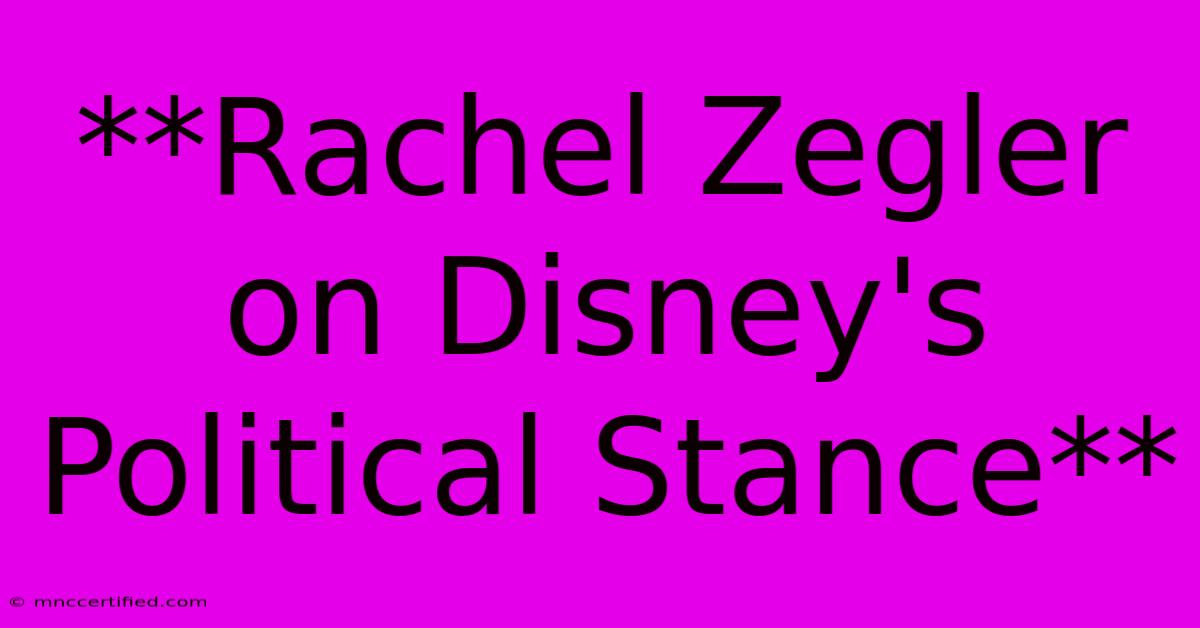**Rachel Zegler On Disney's Political Stance**

Table of Contents
Rachel Zegler's Vocal Criticism: Disney's Political Stance and the Impact on "Snow White"
Rachel Zegler, the star of Disney's upcoming live-action "Snow White," has recently sparked conversation about the company's political stance and its impact on the film's production and promotion. Zegler's vocal criticisms, while initially sparked by a specific incident, have opened a wider debate about the intersection of art, entertainment, and political ideology.
The Florida Bill and a Fan's Question
The controversy began with a fan's question on Twitter about Zegler's involvement in the film, given Disney's stance on Florida's "Don't Say Gay" bill. This bill, which restricts the discussion of sexual orientation and gender identity in schools, has been widely condemned by LGBTQ+ advocates and many public figures, including Disney employees.
Zegler's response was candid and direct. She acknowledged Disney's involvement in the legislation and expressed her personal disappointment, saying, "As a woman who has benefitted from the work of those who have come before me, I find it disheartening to know that some of the people in charge are actively trying to erase the lives of LGBTQIA+ people."
A Wider Conversation About Corporate Responsibility
Zegler's words ignited a wider discussion about the role of corporations in politics and the potential consequences for their creative projects. Some argue that Disney, as a major entertainment conglomerate, should be held accountable for its political choices, especially when they contradict the values of its diverse audience. Others maintain that entertainment should be apolitical, and that artists shouldn't be forced to take sides in contentious debates.
This debate is not new. For years, actors and directors have spoken out against political issues, but the advent of social media has amplified these voices, making it difficult for corporations to distance themselves from the actions of their employees or the political landscape.
Implications for "Snow White" and Beyond
Zegler's stance on Disney's political action has raised questions about the future of "Snow White." Some speculate that the controversy could impact the film's release or box office success. Others believe that the film's creative merit will stand on its own, and that its success will depend on the quality of the storytelling and visual spectacle.
Regardless of the outcome, Zegler's outspokenness has opened a dialogue about the evolving relationship between art, politics, and corporate responsibility. This conversation is likely to continue, not just within the realm of entertainment, but in all areas where creative expression and societal values intersect.
Key takeaways:
- Rachel Zegler's criticism of Disney's political stance has sparked a debate about corporate responsibility and the impact on creative projects.
- The "Don't Say Gay" bill and Disney's involvement have fuelled the discussion, highlighting the intersection of entertainment and political ideology.
- The controversy raises questions about the future of "Snow White" and the broader impact of artists' political activism.
- Zegler's comments are a testament to the growing power of individual voices and the increasing pressure on corporations to align their actions with their values.
SEO Keywords: Rachel Zegler, Disney, Snow White, Don't Say Gay, Florida, political stance, corporate responsibility, LGBTQ+, entertainment, box office, controversy, activism.

Thank you for visiting our website wich cover about **Rachel Zegler On Disney's Political Stance**. We hope the information provided has been useful to you. Feel free to contact us if you have any questions or need further assistance. See you next time and dont miss to bookmark.
Featured Posts
-
Spend Management Saps Industry View
Nov 15, 2024
-
Cross Review Amazons Patterson Detective
Nov 15, 2024
-
Atlanta Bonded Warehouse Bldg 118
Nov 15, 2024
-
Breast Milk Bags Through Insurance
Nov 15, 2024
-
Brazil Held To 1 1 Draw By Venezuela In Qualifiers
Nov 15, 2024